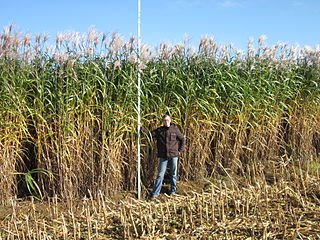
The almond is a species of tree from the genus Prunus. Along with the peach, it is classified in the subgenus Amygdalus, distinguished from the other subgenera by corrugations on the shell (endocarp) surrounding the seed.

The pistachio, a member of the cashew family, is a small to medium-sized tree originating in Persia. The tree produces seeds that are widely consumed as food.

Drax power station is a large biomass power station in Drax, North Yorkshire, England. It has a 2.6 GW capacity for biomass and had a 1.29 GW capacity for coal that was retired in 2021. Its name comes from the nearby village of Drax. It is situated on the River Ouse between Selby and Goole. Its generating capacity of 3,906 megawatts (MW), which includes the shut down coal units, is the highest of any power station in the United Kingdom, providing about 6% of the United Kingdom's electricity supply.

Macadamia is a genus of four species of trees in the flowering plant family Proteaceae. They are indigenous to Australia, native to northeastern New South Wales and central and southeastern Queensland specifically. Two species of the genus are commercially important for their fruit, the macadamia nut. Global production in 2015 was 160,000 tonnes. Other names include Queensland nut, bush nut, maroochi nut, bauple nut and, in the US, they are also known as Hawaii nut. It was an important source of bushfood for the Aboriginal peoples.

Mildura is a regional city in north-west Victoria, Australia. Located on the Victorian side of the Murray River, Mildura had a population of 34,565 at the 2021 census. When nearby Wentworth, Irymple, Nichols Point, Merbein and Red Cliffs are included, the combined urban area had a population of 58,914 in 2021, having grown marginally at an average annual rate of 1.3% year-on-year over the preceding five years.

Thomastown is a suburb of Melbourne, Victoria, Australia, 16 km driving distance approximately 30 minutes north of Melbourne's central business district, located within the City of Whittlesea local government area. Thomastown recorded a population of 14,234 at the 2021 census.

The Sanitarium Health and Wellbeing Company is the trading name of two sister food companies. Both are wholly owned by the Seventh-day Adventist Church.

Merbein is a town in the Rural City of Mildura, Victoria, Australia. It is on the Calder Highway between Mildura and the Murray River crossing at the Abbotsford Bridge to Curlwaa. At the 2016 census, the town had a population of 1,981. Merbein is 12 kilometres from Mildura, 553 kilometres (344 mi) from Melbourne and 389 kilometres (242 mi) from Adelaide.

Miscanthus × giganteus, also known as the giant miscanthus, is a sterile hybrid of Miscanthus sinensis and Miscanthus sacchariflorus. It is a perennial grass with bamboo-like stems that can grow to heights of 3–4 metres (13 ft) in one season. Just like Pennisetum purpureum, Arundo donax and Saccharum ravennae, it is also called elephant grass.

Carina is a locality in the Rural City of Mildura in Victoria, Australia. It is situated in the Sunraysia region on the Mallee Highway and Pinnaroo railway line. It is situated about 10 kilometres east from Panitya and 14 kilometres west from Murrayville.

Namibia Power Corporation, commonly known as NamPower, is the national electric power utility company of Namibia. The company is responsible for generation, transmission and distribution of electricity in the country. Its activities are licensed, supervised and regulated by the Electricity Control Board (ECB) of Namibia.

Sugarcane or sugar cane is a species of tall, perennial grass that is used for sugar production. The plants are 2–6 m (6–20 ft) tall with stout, jointed, fibrous stalks that are rich in sucrose, which accumulates in the stalk internodes. Sugarcanes belong to the grass family, Poaceae, an economically important flowering plant family that includes maize, wheat, rice, and sorghum, and many forage crops. It is native to New Guinea.

Dandaragan is a small town in the Wheatbelt region of Western Australia. The Dandaragan plateau is the underlying geological feature of the area.

SunRice is the consumer brand and trading name of Ricegrowers Limited, which is one of the largest rice food companies in the world and one of Australia's leading branded food exporters. In the 2023 Financial Year, the company recorded revenue of A$1.6 billion and Net Profit After Tax of A$54.8 million.

Bioenergy with carbon capture and storage (BECCS) is the process of extracting bioenergy from biomass and capturing and storing the carbon dioxide (CO2) that is produced.

Energy in Australia is the production in Australia of energy and electricity, for consumption or export. Energy policy of Australia describes the politics of Australia as it relates to energy.
The Wonderful Company LLC is a private corporation based in Los Angeles, California. With revenues of over $4 billion, it functions as a holding company for Stewart and Lynda Resnick and as such is a vehicle for their personal investments in a number of businesses.
Templeborough Power Station is a biomass power station situated in Templeborough on the River Don in Rotherham England. Operated by Copenhagen Infrastructure Partners, it opened in 2018 with an operating capacity of 44 megawatts.
The Bannerton Solar Park is a solar power station in Bannerton south-east of Robinvale in the Sunraysia district of Victoria. It generates up to 88MW of electricity to the National Electricity Market (NEM).
















